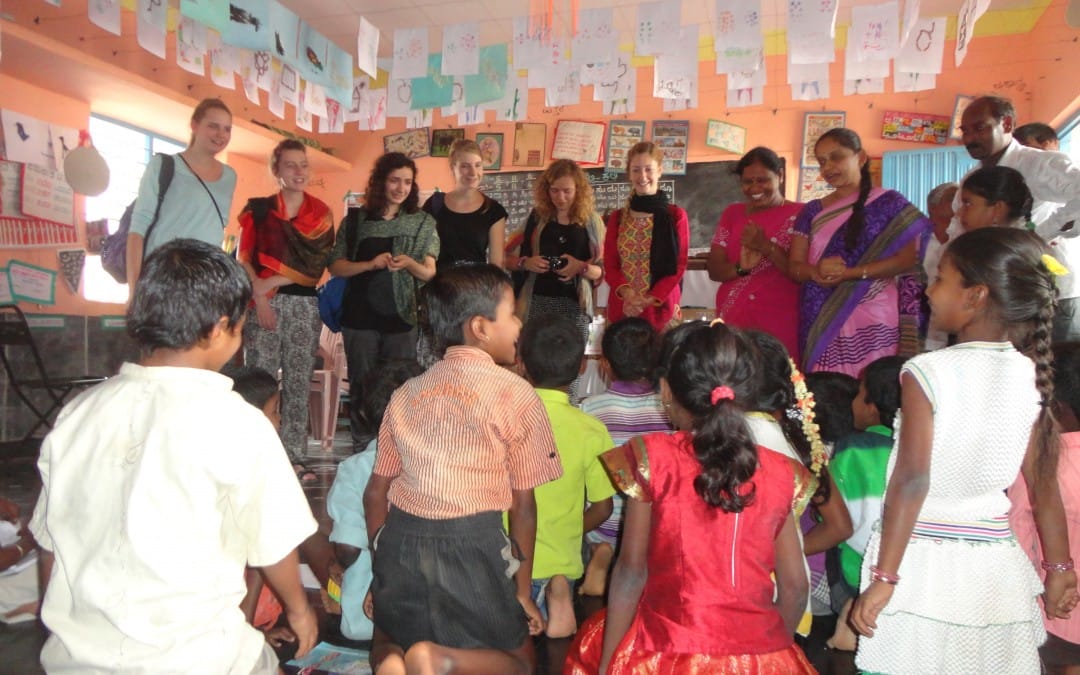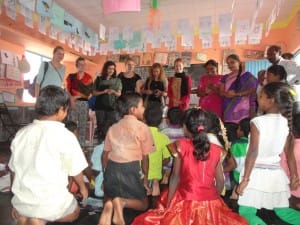
by iphindia | Aug 2, 2011 | Education, Internship, Latest Updates

The Institute of public health hosted a group of 10 Maastricht University students on an Exposure visit to India program.
The students were participants of the Honours International program at Maastricht university.
The 3 week program from July 11 – July 28 2011 focused on exposing the students to the health system of the country.
The program was directed to equip students with better skills, knowledge and practices about inter country public health sceneries with special focus on the differences between multiple health care systems and also the regional and cultural perspectives.The prime component of the program were exposure to field visits. The students were also provided with theoretical framework/background to link the observations made in the field, much better.
The main topics covered under the program were health care system in India, social determinants of health, communicable and non communicable diseases, child and maternal health care in India, health service organisation, community health and health care financing in India.
by iphindia | Jul 31, 2011 | Latest Updates, Publications
View all publications
Where hunting pressure is high, anti-poaching efforts are often crucial for protecting native wildlife populations in nature reserves. However, many reserves suffer from inadequate support and provisioning of staff, especially in developing nations. In Pakke Tiger Reserve in northeastern India, we found that malarial infection is a serious hindrance for front-line patrolling staff that limits the time they can spend in the field. We assessed the consequences of malaria both for local people and park staff in the general region and its indirect effects on wildlife protection. To accomplish this we compiled data from annual epidemiological records of malaria, the number of malaria cases and associated mortality, financial costs, and loss of time spent patrolling. Over a 4-year period (2006–2009), the majority (71%) of forest department staff in Pakke Tiger Reserve suffered from malaria. Malaria treatments cost park managers nearly 3% of their total budget and caused a net loss of 44,160 man hours of anti-poaching effort. The government forest and health departments involved in the employment and health of park staff have separate missions and responsibilities, yet our findings show that a multi-disciplinary approach to conservation is essential to avoid overall systemic failure.
Highlights
► We examined the effects of malaria on anti-poaching staff and its consequences for park protection. ► We focussed particularly on protected areas in northeastern India that suffer from significant wildlife poaching. ► Malaria had a measurable impact on the health of forest department staff, park budgets, and anti-poaching efforts. ► Simple, short-term measures, such as the distribution of insecticide-treated nets, reduced infection rates among park staff. ► An ultimate solution is to improve health services and ensure better coordination between forest and health services.
Article type Research article
Authors : Velho N, Srinivasan U, Prashanth NS & Laurance WF
Journal: Biological Conservation
Submission date : 18 March 2011
Acceptance date : 4 June 2011
Publication date : 15 July 2011
Link by iphindia | Jul 15, 2011 | Advocacy, Media advocacy, Publications, Research
Prevalence of tobacco use among adolescents in India is very high. Despite many epidemiological studies exploring tobacco use among youth, there is no published data on adolescents’ perceptions about smokers in Indian society and its implications on tobacco control.
Article type Research article
Authors : Upendra M Bhojani,Maya A Ellias,Devadasan N
Journal: BMC Public Health
Submission date : 8 April 2011
Acceptance date : 14 July 2011
Publication date : 14 July 2011
Link
Download Pdf by iphindia | Jun 27, 2011 | Latest Updates
Five faculty members of IPH participated in the Junior Researchers Workshop from 14th to 17th June, organized by the Royal Tropical Institute (KIT), Amsterdam.
The participants belonged to three study countries namely Vietnam, India and China. This workshop was organized to help the researchers to have a shared understanding of HESVIC key concepts and to develop skills in qualitative research methods including data collection and analysis.
![RSBY workshop at Chhattisgarh]()
by iphindia | May 12, 2011 | Latest Updates, Research

Dr.Tanya Seshadri attended the 3rd National workshop of the Rashtriya Swasthya Bima Yojana was conducted in Raipur, Chhattisgarh from May 3rd to 5th. This national workshop was organised by the Ministry of Labour & Employment and the State Nodal Agency, Chhattisgarh. This workshop brought together stakeholders from across the country to a common platform for discussion. They included State nodal agencies (SNA), Insurance companies (IC), Third party administrators (TPA), Smart card providers (SCPs), few hospitals involved & interested NGOs.
The workshop was inaugurated by the Hon. CM of Chhattisgarh and was followed by brief discussions by representatives of Ministries of Labour & Employment, and Rural development. A simple award ceremony was also conducted to recognise stakeholders for their outstanding service to the scheme in their respective field in each region.
The three day workshop had a systematic approach of presentations and discussions from past experiences and enrollment procedures to data analysis and future plans. Each topic was presented by an SNA/IC team who had been recognised for their work in that particular issue. This use of experiential learning made it easier to comprehend and interesting for all irrespective of their involvement/prior knowledge of RSBY procedure and activities. This in addition to the guidance of key facilitators ensured participation of various stakeholders in all discussions. The focus of the entire workshop appeared to be finding solutions for problems presented via discussions and consensus. Almost all participants appeared to be quite motivated and interested in proceedings of all the sessions judging by the attendance and intensity of discussions across the days.
All documents and media concerning RSBY had been compiled, written to a CD, and made available to all participants. All presentations made during the course will soon be made available on the website in a short time. Apart from the national workshop, regional state level workshops and district level workshops are also regularly conducted.
Presentations of the RSBY workshop





